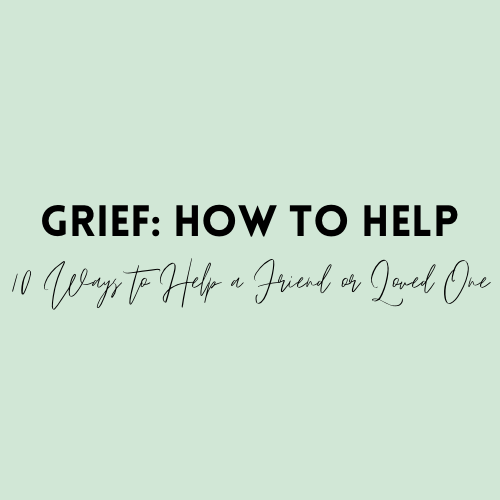
How to Help a Friend or Loved One Experiencing Grief
After my dad died at age 19, I experienced a lot of grieving while in college. At that age, no one really knows how to help, and that’s not their fault. I also found that grief makes a lot of people uncomfortable.
It was hard to navigate talking to my friends, and even my family, about my grief. I didn’t know who I could talk to without making them uncomfortable. I didn’t know who I could trust to feel my grief in front of them. With my family, we didn’t even know how to be there for each other.
This being said, I did have a couple of friends who I could always go to and be comfortable with. Eventually, I found that I wasn’t afraid to reach out anymore. The way they were there for me taught me how to trust and feel comfortably. Their example is how I want to be there for someone else who is grieving.
So, I compiled a list of 10 things I found that actually helped. Keep in mind, if you’re unsure, just ask the person what they need. They might not know what they need, but it feels good to be asked instead of told.
1. Be available.
No, you don’t have to change your entire life to be available to them all the time. But, be available in the sense that they know you are available. they know you are there for them if they need you. Once you have shown you are available one time, it’s easier for them the next time.
All it took was me asking my friend one time to talk or to just come over to be around someone, and then I was comfortable doing it again. Once I was able to recognize that she was really there for me, I didn’t feel so scared the next time. It made it easier to ask for help.
2. Be willing to check in first, even after just the first few months.
A lot of times, it’s scary to be the one to reach out. It felt like my grief would be burdensome or uncomfortable to other people. Also, it felt like once the funeral and a couple months had passed by, other people forgot.
If you can make the effort to check in with the person first, it goes a long way. When you check in, make sure it’s genuine that they can show how they’re feeling. You don’t want it to feel like you’re just checking a box.
With grief, the real emotions for them might not even come out right away. Remember to check in with them consistently even after the shock might have worn off for you. Typically, that’s when everyone else stops checking in, so it will be comforting to know that someone else remembers. It will be comforting that even when others forgot, you didn’t.
3. Be okay with not knowing exactly what to do or say – show up anyway.
Even though I can tell you all of these things, every person is different. It will feel strange to not know the perfect thing to say. We are all so accustomed to giving advice and having to respond in a positive way. It’s okay not to know. You can acknowledge that you don’t know. The best thing to do in those situations is to show up anyway.
Keep showing up even when you don’t feel like you’re helping or giving anything to them. Your presence alone is helping. Not being scared of the pain of others is the best way to show that you care about them.
4. Be okay with being uncomfortable.
Death or loss is scary and it’s uncomfortable. I’m on a mission to normalize grief, but it’s still such a taboo subject. This means we are innately used to being scared of grief. It is a terribly hard emotion, but everyone will go through it at some point.
If you are uncomfortable talking about it with someone, understand that they are more uncomfortable feeling it. It is not an easy subject, but you have to be willing to put yourself in those uncomfortable situations. Once you do it once, you will realize that it’s not so uncommon. You will will realize that it’s not as uncomfortable as you think.
5. Be fully present.
There’s nothing worse than someone asking if they can talk, and the person doesn’t seem to care. If that person has actually gotten up the courage to ask you to talk, be fully present. If you ask them how they are doing, don’t ask that lightly. Be fully present. This is so important, because grief is the most vulnerable thing to share. If someone is trying to share that with you, be so grateful that they see you as someone trustworthy. It’s the highest compliment.
It feels even worse to share your grief with someone, and they are distracted or only half-listening. It made me close off even more if someone did that, because it just didn’t feel worth it. I simply needed to know someone was truly there and that my feelings were valid. You have to be fully present or it doesn’t help at all.
6. Let them feel without fear.
It is scary to feel emotions in front of others. A lot of times, it’s easier to do it privately. But, grief is a lonely emotion. More often than not, it’s so taboo because it’s something we keep to ourselves. Sure, we can feel it, but it just gets easier to feel it alone rather than try to explain it to someone else.
Letting someone feel their grief without fear of judgment or discomfort is a whole different ball game. Once you can find that person who just lets you feel everything, it actually helps. It helps to have someone around who you know will be okay with the emotions instead of fearful of them.
7. Let them rest in your presence.
Again, grief is a lonely emotion. Sometimes, all that person needs is just to be around someone. Sometimes, I didn’t want to talk. I didn’t want to cry. All I wanted was to just be near someone who understood that. I just needed to sit in the presence of someone else and not feel so alone.
It’s easy to try to fill the silence or fill the void, but less is more. Sometimes, you just have to be there. Be willing to just eat chocolate on your bedroom floor without saying a word. You both know what’s happening, and it’s okay to just let it happen. It will feel good for that person to just rest. Let their mind rest, and let their heart rest for a second.
8. Let them talk.
I can’t stress this enough. Let them be the one to talk. You don’t need to constantly offer advice or feedback on how they are feeling. Just let them talk. Let them get everything off their chest first. They can’t control their grief, and they can’t change how they are feeling. It’s not so helpful to try to patch the hole that’s in their heart. Your words and advice can’t do that. Your presence and your friendship and your love can.
Again, it’s easy to feel the need to fill the empty space, but it’s okay to not have the right thing to say. If you are just trying to offer something to the conversation, it’s okay to not say anything instead. If they ask for advice or help talking out their grief or feelings, by all means answer them! Just don’t offer unnecessary advice just to make yourself feel better.
9. Let them cry.
I can’t tell you the number of times I cried in front of my friends. At first, it was uncomfortable. I realized, though, that they would just let me cry. They would let me feel all of that grief and they knew that getting it out would help me feel better. Sometimes, you just need to cry and to have someone who lets you.
I cried without fear, and I cried without any trigger. I just needed to cry sometimes. My friends didn’t feel the need to get me to stop crying. They didn’t feel as if they needed to talk to me through that and try to help me in that moment. They just understood that I needed those feelings out of my head. Crying was the only way to do that sometimes, so let them cry. Let them fully feel.
10. Let them feel without trying to make it better.
I’ve said this throughout the whole post, but it’s that important. Let them feel without trying to make it better. It’s not your job to fix them. It’s not your job to get them to stop grieving. When they come to you or you go to them to help, know that the purpose isn’t to make it better. The purpose is to be there for them and to not let them feel so alone in their pain.
Grief doesn’t just get better. Your friend or your loved one has to be able to feel that grief in order to keep moving forward. If they are uncomfortable with their grief or you try to “make it better” every time, they won’t ever come to terms with those feelings. The point of grief isn’t to fix it and to be happy again. Grief is an emotion, and emotions come and go. Some days they will be happy, and some days they will be so sad they don’t know if they can go on. The point is to be a presence that lets them see that even when they feel grief, it doesn’t hurt so bad forever. That pain isn’t going to last.
In the end, you’re helping them go through the process of being okay with the pain of grief. You’re helping them feel and heal. Just by being there and being willing to not let the discomfort take over, you are helping them. The hardest part of grief is feeling like it won’t ever end. Each time you let them talk it out or cry it out or sit it out, you are riding that wave of pain with them and coming out the other side with them. You are showing them that it won’t last forever.
Being there for a friend or loved one who is grieving isn’t easy, but it’s so important. It doesn’t take away the pain of grief, and it’s not meant to. But it makes it so that they won’t feel so alone in it. It makes it so that they don’t get stuck in their head, therefore in their grief.
Just by reading this, you already show that you have the heart to help. So from everyone who grieves, thank you. Thank you for being willing to face this with us.
For More:
To read more about things to know, click here: 10 Helpful Reminders to Get You Through Grief.
For more about my hot take on grief, click here: Stop Telling People Who Grieve That They Are “Strong”.
To read more about how to keep their memory alive, click here: 10 Simple Ways to Honor Your Loved One (or Yourself!) on Anniversary Days.
You May Also Like

Iceland and London in 1 Week | Route and Itinerary
March 10, 2019
Out West, USA: Zion, Bryce Canyon, Grand Canyon, and Las Vegas in 3 Days
September 29, 2019



2 Comments
Pingback:
Pingback: